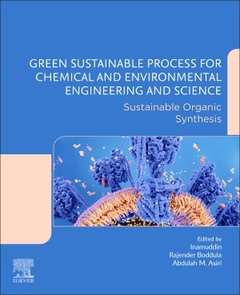Description
Green Sustainable Process for Chemical and Environmental Engineering and Science
Sustainable Organic Synthesis
Coordinators: Boddula Rajender, Asiri Abdullah M., Inamuddin
Language: English
Subject for Green Sustainable Process for Chemical and Environmental...:
Keywords
1, 3-Dipolar cycloaddition, API synthesis, Aqueous extracts, Atom economic, Atom economy, Bioactive heterocycles, Biocatalysis, Biocompatible, Biomass, Biomedical, Biomolecules, Click chemistry, Click reaction, Continuous-flow, Cyclodextrin, Eggshell powder, Environmental remediation, Enzymes, Fe3O4, Flow chemistry, Green, Green catalyst, Green chemistry, Green chemistry principles, Green solvent, Green synthesis, Heterocycles, Ionic liquids, Lemon juice extract, Metal oxides, Microwave-assisted synthesis, Multistep synthesis, Nanoparticles, Neat, Organic synthesis, Organic transformations, Organo-modifier, Oxidation, Photocatalysis, Photosensitizer, Process chemistry, Radical, Remediation, Selectivity, SiO2, Solvent-free, Supercritical water, Sustainable chemistry, Sustainable modifier, Tetrazoles, Thiol-ene, TiO2, Triazoles, Visible-light-promoted reaction, Water extract of banana, Water extract of rice straw ash, ZnO
506 p. · 19x23.3 cm · Paperback
Description
/li>Contents
/li>Readership
/li>Biography
/li>Comment
/li>
Green Sustainable Process for Chemical and Environmental Engineering and Science: Sustainable Organic Synthesis provides an in-depth overview in the area of organic, pharmaceutical, engineering and environmental sciences, with a focus on the purification and extraction of fine chemicals, alternative green solvents, medicinal, analytical drugs, and bioactive compounds utilizing green chemistry protocols. It also focuses on the nanocatalysis, biocatalysis, solvent-free, recyclable organocatalysis, solid-supported reagents, heterogeneous polymer reusable catalysis, and CO2 conversion to commercial chemicals, utilizing industrial strategies such as flow-reactor, microwave, ultrasonics, ball-mill, photochemical and electrochemical methods.
2. Atom-economy green organic synthesis
3. Microwave-assisted organic synthesis
4. Ultrasound-assisted organic synthesis
5. Bioenzyme-assisted organic synthesis
6. Micellar-assisted organic synthesis
7. Solvent-free organic synthesis
8. Green organic synthesis by carbon oxide conversion
9. Ionic liquids-assisted organic synthesis
10. Green organic synthesis in supercritical water
11. Sustainable organic synthesis by electrochemical protocol
12. Green organic synthesis by flow approach
13. Recyclable organocatalysis in organic synthesis
14. Organic synthesis by photochemical protocol
15. Organic synthesis by eco-friendly solvents beyond water
16. Sustainable organic synthesis by water vs supercritical water
17. Nanocatalysis in Sustainable organic synthesis
18. Biocatalysis in organic synthesis
19. Recoverable polymer catalysis in organic synthesis
20. Solid-state sustainable organic synthesis
21. Employing sustainable pathways for organic synthesis
Prof. Abdullah M. Asiri is the Head of the Chemistry Department at King Abdulaziz University since October 2009 and he is the founder and the Director of the Center of Excellence for Advanced Materials Research (CEAMR) since 2010 till date. He is the Professor of Organic Photochemistry. His research interest covers color chemistry, synthesis of novel photochromic and thermochromic systems, synthesis of novel coloring matters and dyeing of textiles, materials chemistry, nanochemistry and nanotechnology, polymers and plastics. A major achievement of Prof. Asiri is the discovery of tribochromic compounds, a class of compounds which change from slightly or colorless to deep colored when subjected to small pressure or when grind. This discovery was introduced to the scientific community as a new terminology published by IUPAC in 2000. This discovery was awarded a patent from European Patent office and from UK patent. He is also a member of the Editorial Board of various journals of international repute. He is the Vice- President of Saudi Chemical Society (Western Province Branch). He holds four USA patents, more than 800 Publications in international journals, seven book chapters, and ten books
Inamuddin is an assistant professor at the Department of Applied Chemistry, Zakir Husain College of Engineering and Technology
- Covers a broad overview of sustainable organic synthesis
- Outlines eco-friendly organic synthesis using novel techniques and chemical processes, i.e., photochemical, electrochemical, microwave, bio-strategies, etc.
- Gives a detailed account of green, large-scale techniques in organic synthesis and their applications in pharmaceutical production
- Presents cutting-edge, recent advances in industrial pharmaceuticals and the technologies involved in medicinal and organic chemistry
- Provides a systematic discussion of each technology in organic synthesis, including main parameters and challenges




